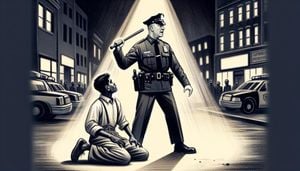Nigel Farage, the unmistakable political maverick behind the Brexit movement, has declared his staunch support for Donald Trump as the United States approaches another pivotal presidential election. Farage, who has made the transatlantic trip to campaign alongside Trump, is making waves more than just with his presence; he is actively engaging with voters under the shadow of one of the most contentious elections the U.S. has faced.
At one of Trump’s rallies held just days before the November 2024 elections, Farage was singled out as the British politician with close ties to the Republican hopeful. Trump introduced him to the crowd, referring to him as 'a little bit of a rebel’ and praising his significant influence on UK politics. 'He's shaking it up pretty good,' Trump said, referencing Farage’s role as leader of Reform UK. Trump went on, acknowledging Farage as 'the big winner of the last election' across the pond, recognizing the similarities between their political ideologies.
The bond between Trump and Farage is emblematic of the growing camaraderie between European nationalists and American conservatives. Observing the rally atmosphere, Farage noted, 'There are a lot more Trump signs on lawns' this election season compared to four years ago, signaling increased grassroots support for the former president. He expressed certainty about Trump's chances, aligning his perspectives with the sentiments of many Trump supporters.
Yet, amid the fervor of election campaigns, Farage's presence has not gone unnoticed back home. Questions have arisen concerning his absence from the UK Parliament at such a pivotal time. Labour MP Patrick Hurley pointedly remarked on Farage's choice to traverse 3,500 miles away from his constituents at Clacton, as Parliament was actively sitting. The optics of his U.S. campaign have led to critiques about his political priorities.
Farage had some straightforward advice for Trump if he were to lose the election to Kamala Harris: 'go play golf.' This seemingly jocular remark carries weight, underscoring Farage's hope for Trump to exit gracefully should the results turn against him. 'If it was clear and decisive, then maybe it’s time to go and play golf at Turnberry,' he explained, referring to Trump’s prestigious golf club.
To highlight the tension surrounding the election, Farage has also expressed concerns about the potential fallout if Trump were to lose. Referencing the surprising events of the January 6 Capitol riots following Trump’s previous loss, he urged prudence on both sides of the race. 'Republicans have to accept the result,' he warned, advocating for political civility. His insights reflect both apprehension and resolve, with the backdrop of potential civil unrest hanging heavily over the electoral process.
Adding another layer to the complex narrative, Farage advised Harris, should she win, to pardon Trump. 'She could look magnanimous,' he argued, hinting at the importance of a peaceful political transition for maintaining societal stability. This statement encapsulates Farage’s uniquely positioned perspective—firmly supporting Trump but recognizing the sensitivity of the moment.
The close race has been feeding down to the wire, with polls indicating razor-thin margins between Trump and Harris. Political analysts have dubbed this election potentially one of the closest races in history, with major platforms and independent pollsters touting conflicting predictions. According to data from FiveThirtyEight, the Democratic candidate faced Trump with just slight margins, heightening the stakes for every rally and every vote.
This election is not merely about the candidates but also about the shifting dynamics of political alliances and identity. Farage has positioned himself as both Trump’s friend and the face of British right-wing populism, forging ties with the American political fabric. Veteran political commentators are keeping their eyes on how Farage's influence might sway perceptions among American voters and potentially translate to tangible electoral support for Trump.
Back on the campaign trail, the rallies exude energy. Whether it be the sound of chants whipping through the crowd or the sea of red caps adorned with the familiar slogan, one thing is clear: the enthusiasm for Trump remains vibrant, feeding off Farage's presence. 'I have never gone along with the stolen election narrative,' Farage publicly denounced, aligning himself squarely with the need for democratic integrity, something he argues is fundamental for both American and British politics alike.
With just hours to go before polls close, the U.S. finds itself at a crossroads. The influence of foreign political figures like Farage could pave the way for broader acceptance of unconventional candidates, leaving many to wonder not just who will win, but what the future holds for transatlantic political relations.
The stakes are high, and as the ballots get counted, the world watches for not only the electoral outcome but also for the larger narrative on democracy, identity, and national integrity.



